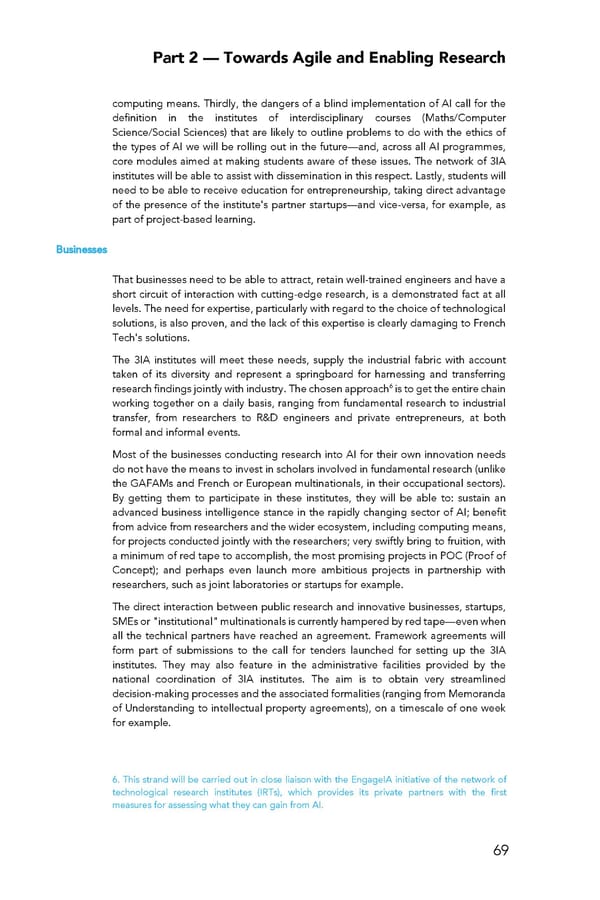Part 2 — Towards Agile and Enabling Research computing means. Thirdly, the dangers of a blind implementation of AI call for the definition in the institutes of interdisciplinary courses (Maths/Computer Science/Social Sciences) that are likely to outline problems to do with the ethics of the types of AI we will be rolling out in the future—and, across all AI programmes, core modules aimed at making students aware of these issues. The network of 3IA institutes will be able to assist with dissemination in this respect. Lastly, students will need to be able to receive education for entrepreneurship, taking direct advantage of the presence of the institute's partner startups—and vice-versa, for example, as part of project-based learning. Businesses That businesses need to be able to attract, retain well-trained engineers and have a short circuit of interaction with cutting-edge research, is a demonstrated fact at all levels. The need for expertise, particularly with regard to the choice of technological solutions, is also proven, and the lack of this expertise is clearly damaging to French Tech's solutions. The 3IA institutes will meet these needs, supply the industrial fabric with account taken of its diversity and represent a springboard for harnessing and transferring 6 research findings jointly with industry. The chosen approach is to get the entire chain working together on a daily basis, ranging from fundamental research to industrial transfer, from researchers to R&D engineers and private entrepreneurs, at both formal and informal events. Most of the businesses conducting research into AI for their own innovation needs do not have the means to invest in scholars involved in fundamental research (unlike the GAFAMs and French or European multinationals, in their occupational sectors). By getting them to participate in these institutes, they will be able to: sustain an advanced business intelligence stance in the rapidly changing sector of AI; benefit from advice from researchers and the wider ecosystem, including computing means, for projects conducted jointly with the researchers; very swiftly bring to fruition, with a minimum of red tape to accomplish, the most promising projects in POC (Proof of Concept); and perhaps even launch more ambitious projects in partnership with researchers, such as joint laboratories or startups for example. The direct interaction between public research and innovative businesses, startups, SMEs or "institutional" multinationals is currently hampered by red tape—even when all the technical partners have reached an agreement. Framework agreements will form part of submissions to the call for tenders launched for setting up the 3IA institutes. They may also feature in the administrative facilities provided by the national coordination of 3IA institutes. The aim is to obtain very streamlined decision-making processes and the associated formalities (ranging from Memoranda of Understanding to intellectual property agreements), on a timescale of one week for example. 6. This strand will be carried out in close liaison with the EngageIA initiative of the network of technological research institutes (IRTs), which provides its private partners with the first measures for assessing what they can gain from AI. 69
 For a Meaningful AI - Report Page 69 Page 71
For a Meaningful AI - Report Page 69 Page 71